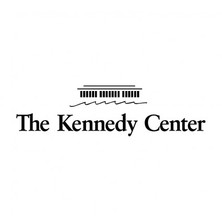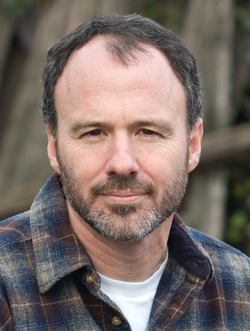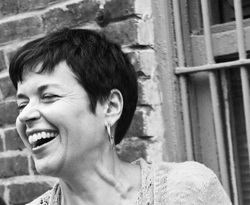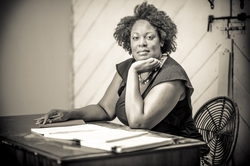 Once again, Norman Allen, Renee Calarco and I served as mentors to young playwrights who had been awarded the 2013 Playwrights Discovery Award as part of The Kennedy Center's Department of VSA and Accessibility. This year’s distinquished recipients were chosen from more than 350 applications nationwide and an excerpt of their work will be presented at the Kennedy Center as part the 11th Annual Page-to-Stage Festival. In my next post, I'm going to introduce you to the mentors and share their experience and the role of mentorship! For now, here's more information about the reading and the wonderful young playwrights!!! The John F. Kennedy Center for the Performing Arts presents the 28th Annual Playwright Discovery Performance Staged readings of four award-winning student scripts Sunday, September 1, 2013 at 6:00 p.m. MILLENNIUM STAGE SOUTH I had a wonderful experience again this year, so wanted to check in with Norman and Renee. They were kind enough to share their thoughts. Please enjoy and I hope to see you on Sunday!  What excited you about working with VSA Playwrights Discovery Program again this year? I had such a fantastic time working with the program last year that I jumped at the opportunity to return. The process itself is rather dramatic. You spend several weeks working with your young playwright by phone and email. You get to know them and their work and their goals. You share ideas about what it means to collaborate with actors and directors. Then suddenly the day comes when they arrive in Washington and you get to be in the same room together. Last year, it was especially interesting to watch the young playwrights during the rehearsal process. I think it’s always difficult and complicated when a playwright lays their work before other artists. It takes a level of maturity to be open and flexible, and yet also hold fast to your central vision. A lot of adult playwrights I know have never mastered this. To watch young writers move toward it can be very moving. Who is your playwright and why should audiences come experience his/her play? Will Hedgecock is a brilliant young writer, with an incredibly mature comic sense. His play Bad Days is an exploration of depression, how it affects a person, and how that person is perceived by others. But he does this with a light, comic touch. It’s a very difficult line to walk – taking a very serious subject and dealing with it in a humorous way. Will walks that line brilliantly. He also has a lot to say with this play. It touches on family relationships, on romance, on loyalty. It’s the portrait of a young man discovering his own strength, and I think audiences will discover some new perspectives by stepping into this story. What are your thoughts on mentorship? You know I can’t get through this interview without quoting The King and I. Mrs. Anna sings, “If you become a teacher, by your pupils you’ll be taught.” And she’s right. I spent the last year working as a mentor with the Center for Inspired Teaching, coaching teachers in DC public schools. I never left one of those classrooms without knowing more than I went in. It’s the same here. The key to mentoring is, actually, recognizing that it’s very different from teaching. You’re not there as the expert, or the one who holds all the knowledge. You’re there to enter into conversation with another artist who has similar interests and similar goals. There was definitely stuff I had to share with Will after working as a playwright for the last twenty years, but Will and I met as equals, and I think we both benefited from the experience. NORMAN ALLEN Norman Allen’s work for the stage has been commissioned and produced by the Kennedy Center, the Shakespeare Theatre Company and the Karlin Music Theatre in Prague, where his contemporary Carmen (score by Wildhorn & Murphy) ran for three years and was recently released as a 3D film. While playwright-in-residence at Signature Theatre, Allen premiered Fallen from Proust, In the Garden (MacArthur Award), and Nijinsky’s Last Dance (Helen Hayes Award, Outstanding Play), with subsequent productions across the U.S. and Europe. A member of Playwrights Arena at Arena Stage, his recent projects include Word Dance Theater’s inter-disciplinary Once Wild: Isadora in Russia, an adaptation of George Eliot’s Daniel Deronda, and upcoming productions of Carmen in Tokyo and Seoul.  What excited you about working with VSA Playwrights Discovery Program again this year? Last year, I had such a great time—and learned so much from my mentee—that I absolutely jumped at the chance to work with VSA again. I love working with young playwrights because they’re still exploring and learning and doing astonishing things with their scripts. And their energy is contagious! Last year, after the weekend was over, I dove right back into a script I’d been struggling with. There’s something about the community of young writers that’s so inspirational. Who is your playwright and why should audiences come experience his/her play? Mickey Liebrecht is 16 and thinks big. Really big. Her play, BROKEN BODIES, has a cast of 13. Several characters speak American Sign Language. It’s a play about broken bodies…broken relationships…and the ultimate healing that comes with time. Also, Mickey’s got an amazing ear for dialogue, which is something you just can’t teach. Though her play has 13 characters, each one of them has his or her own unique voice. It’s quite an accomplishment. (A note: the excerpt we’ll be hearing at Millenium Stage does not involve all 13 of those characters!) What are your thoughts on mentorship? I love it. We so often talk about “giving back” to our communities in one way or another, but I have to admit that I feel like I’m taking more than I’m giving. Again, it’s that energy and enthusiasm that inspires me so much. And I think we all need mentors—no matter how old we are or how many hours we’ve spent writing and revising. It helps to have someone to not only guide you, but to also act as a sounding board and peer. It’s more of a give-and-take relationship, which I just love. RENEE CALARCO Renee Calarco is a playwright, teacher and performer. Her plays include The Religion Thing (2013 nominee for the Charles MacArthur Award for Outstanding New Play), Short Order Stories (2007 recipient of the Charles MacArthur Award), The Mating of Angela Weiss, Bleed, First Stop: Niagara Falls, If You Give a Cat a Cupcake, and others. Her plays have been produced, developed, and commissioned by Theater J, Charter Theater, Geva Theatre, Project Y, Adventure Theatre, Doorway Arts Ensemble, and the Source Theatre Festival. Renee teaches both playwriting and comedy improv at The Theatre Lab, and she teaches playwriting at George Washington University. She’s a founding member of The Welders and a proud member of The Dramatists Guild. Fun random fact: she’s also a licensed professional tour guide.  What excited you about working with VSA Playwrights Discovery Program again this year? The mission of the program is what drew me back. Also, it’s wonderful to be a part of the professional experience that these young playwrights get to experience. It’s amazing to be at the beginning of a process with a young playwright. I get to all the things to her that I wish had been said to me in terms of honoring voice and vision for the play. Both years, I was in the process of writing my own play and I learned a lot from each meeting about coming back to the “What if?” and about remembering what originally drew me to the story and characters in the first place. What’s more, any and all advice I gave to my mentee, I turned back and gave to myself! Finally, there’s nothing like getting that late night text that says, “I finished the next draft! It’s only its way!” It’s beautiful to be able to celebrate that success with someone who understands that feeling. Who is your playwright and why should audiences come experience his/her play? Nicole Zimmerer is an extraordinary young woman and I am fortunate for having spent this time with her. She is a talented, passionate, smart and hardworking writer. In her play, Falling with Grace, we meet a teenager working to figure out the rest of her life. She has cerebral palsy, but doesn’t want to be defined or limited by her disability. She is quite independent, which makes it difficult to confront feelings of the loss and anxiety that comes with major transitions in life such as graduation. She lashes out at those she loves, when really she wants to hold on them and keep every still, everything in place. It’s a beautiful play, a brilliant journey of struggle, acceptance, and hope. What I love most about this play are the relationships between women. It’s a play about mothers and daughters, and also about best friends of two generations. It’s funny, insightful and unlike any play that I’ve ever before experienced. What are your thoughts on mentorship? When I think about mentoring, I think about this quote from Benjamin Franklin: “Tell me and I forget, teach me and I may remember, involve me and I learn.” I completely agree with Norman that being a mentor different from being a teacher. It’s a process of engaging another person in rich, inspired and challenging dialogue about shared passions, thoughts and ambitions. This allows each person to come to the conversation at different points of entry, different levels of experience and different points of views. You meet in a place of respect and admiration. After reading Nicole’s play, I was excited to speak with her about the process of writing and about how we go deeper into our characters to make them bolder, richer and more realized. But this wasn’t about what I could teach her; it was about sharing what we each experienced in our lives and how that could manifest on the page. I consider myself very fortunate to have been a part of this experience. JACQUELINE E. LAWTON Jacqueline E. Lawton received her MFA from the University of Texas at Austin, where she was a James A. Michener Fellow. Her plays include Anna K;Blood-bound and Tongue-tied; Deep Belly Beautiful; The Devil’s Sweet Water;The Hampton Years; Ira Aldridge: the African Roscius; Lions of Industry, Mothers of Invention; Love Brothers Serenade, Mad Breed and Our Man Beverly Snow. She has received commissions from Active Cultures Theater, Discovery Theater, National Portrait Gallery, National Museum of American History, Round House Theatre and Theater J. Her play, Cinder Blocks, was published in Experiments in a Jazz Aesthetic: Art, Activism, Academia, and the Austin Project (University of Texas Press). A 2012 TCG Young Leaders of Color, she has been nominated for the Wendy Wasserstein Prize and a PONY Fellowship from the Lark New Play Development Center. About VSA
VSA, the international organization on arts and disability, was founded more than 35 years ago by Ambassador Jean Kennedy Smith to provide arts and education opportunities for people with disabilities and increase access to the arts for all. VSA is an affiliate of the John F. Kennedy Center for the Performing Arts. For more information, www.vsarts.org. About Education at the Kennedy Center As the national center for the performing arts, the John F. Kennedy Center for the Performing Arts is committed to increasing opportunities for all people to participate in and understand the arts. To fulfill that mission, the Kennedy Center strives to commission, create, design, produce, and/or present performances and programs of the highest standard of excellence and of a diversity that reflects the world in which we live—and to make those performances and programs accessible and inclusive.
0 Comments
Your comment will be posted after it is approved.
Leave a Reply. |
My BlogI'm a playwright, dramaturg, and teaching artist. It is here where you'll find my queries and musings on life, theater and the world. My posts advocate for diversity, inclusion, and equity in the American Theatre and updates on my own work. Please enjoy!
Categories
All
Archives
June 2020
Reading List
|
